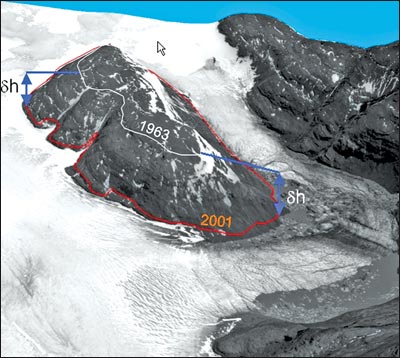|
Climate change:
New study backs UN panel on ocean rise
The UN's climate panel has been backed over a key question as to how
far global warming will drive up sea levels this century, a study
published on Sunday says.
The UN experts are right that the oceans are unlikely to rise by an
order of metres (many feet) by 2100, as some scientists have feared, it
says.
But, its authors caution, low-lying countries and delta areas could
still face potentially catastrophic flooding if the upper range of the
new estimate proves right.
In a landmark report in 2007, the UN's Intergovernmental Panel on
Climate Change (IPCC) predicted oceans would rise by 18-59 centimetres
(7.2 and 23.6 inches) by 2100.
|

One of the biggest glaciers in the southern hemisphere, the Cook
glacier on Kerguelen, an island in France’s southern Indian
Ocean territories. Combining satellite images with other data,
glaciologists from the Laboratory for Studying Geophysics and
Space Oceanography estimate the glacier lost, since 1963, an
average of nearly 1.5 metres (4.9 feet) in height each year by
2003, shedding almost 22 percent of its original volume. AFP |
The increase would depend on warming, estimated at between 1.1 and
6.4 degrees Celsius (1.98-11.52 degrees Fahrenheit) this century, which
in turn depends on how much man-made greenhouse gas is poured into the
atmosphere.
It based the calculation on thermal expansion of the seas - when a
liquid is warmed, it grows in volume.
Harder to calculate, the IPCC admitted, was how far meltwater from
glaciers and icesheets on land would boost sea levels.
It ventured a provisional calculation, suggesting contributions from
those sources could push the upper limit to 76 cms (30.4 inches).
The new paper, led by Mark Siddall of Britain's University of
Bristol, used data from fossilised coral and from ice-core measurements
to reconstruct sea-level fluctuations over the past 22,000 years, from
the height of the last Ice Age to the balmy era of today.
This century, they calculate, the seas will rise by between seven and
82 cms, all sources included, on the basis of a 1.1-6.4 C (1.98-11.52 F)
warming - an estimated increase that is in the same ballpark as the
IPCC's.
The study appears in the journal Nature Geoscience.
"Given that the two approaches are entirely independent of each
other, this result strengthens the confidence with which one may
interpret the IPCC results," said Siddall.
But, he said, no-one should be kidded into thinking the flooding
threat was over.
"The fact that this number is smaller than other numbers does not
mean that this is not potentially a massive and very important sea level
rise," Siddall told AFP in a telephone interview.
"Fifty centimetres (20 inches) of rise would be very, very dangerous
for Bangladesh, it would be very dangerous for all low-lying areas. And
not only that, the 50 centimetres (20 inches) is the global mean.
Locally, it could be as high as a metre (3.25 feet), perhaps even
higher, because water is pushed into different places by the effect of
gravity."
He added: "Extreme flood effects will definitely become more
frequent. If you rise by 50 centimetres (20 inches), floods that once
happened every 100 years then become once a decade." Siddall also
pointed out that sea levels would inevitably rise even higher after the
21st century because of inertial effect.
It takes decades for atmospheric warming to translate into a warming
of the seas because of the vast volume of the ocean, he said.
Thus the 22nd century and beyond will feel the impacts of the warming
of the 21st century.
The IPCC's estimates on sea levels have been repeatedly challenged
since the Fourth Assessment Report was published in 2007.
Several studies have suggested that runoff from the Greenland and
Antarctic icesheets - which hold the world's biggest stores of
freshwater - will be much higher than the panel suspected.
One paper, published in April by Paul Blanchon, a geoscientist at
Mexico's National University, said that, in the distant past, the seas
suddenly rose by three metres (10 feet) within a very time.
AFP |



